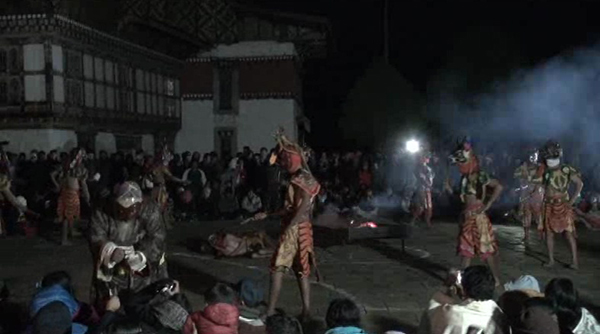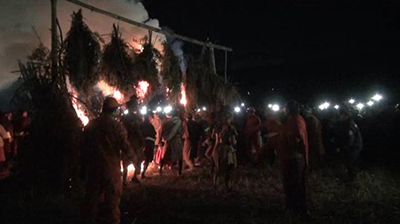 The annual Jambay Lhakhang Drup is a festival of mask dances and rituals based on the Dorling tradition of Buddhism.
The annual Jambay Lhakhang Drup is a festival of mask dances and rituals based on the Dorling tradition of Buddhism.
However, the Mewang or the fire ritual and the Tercham or the naked dance are the main crowd-pullers of the festival. Thousands gathered at the monastery to witness the dance in the early hours of Sunday morning.
Before the Mewang, several mask dances are performed within the monastery’s campus. A ritual (Gegtrey) to purify the place and cleanse the spectators of their misdeeds is also conducted. Next is the much anticipated fire ritual. It is performed in a nearby agricultural field. A gate like structure covered with leaves is set on fire as monks start conducting the ritual. Spectators run through the burning gate which is said to relieve them of their sins and evil.
“At the Jambay Lhakhang Drub, rituals such as Mewang, Jyensig and Torjab are performed to ensure peace and harmony in the country,” explained Chakhar Lam, Chimi Rinzin. “If one receives the blessing of the Mewang, all the obstacles that hinder ones wellbeing will be cleared.”
The fire ritual is then followed by several mask dances at the monastery’s courtyard. Then comes the Tercham or the naked dance finally. A group of about fifteen men whose faces are wrapped in a white clothing but otherwise stark naked take centre stage. However, no cameras or mobile phones are allowed to film the dance.
“When Guru Rinpoche performed the Tercham in the 8th century, all the demons and spirits were awed by the dance and were fully engrossed into it. In the meantime, Guru Rinpoche completed constructing the Nabji Lhakhang. So, the spectators have to genuinely offer their prayers and consider the Tercham performers as Guru Rinpoche himself to get its blessings,” the Lam added.
The five-day annual festival was first instituted as a consecration ceremony by Terchen Dorje Lingpa some seven hundred years ago after he renovated the Jambay Lhakhang. Currently, the descendants of Chakhar Lam and neighboring villages of the monastery carry out the 14th century tradition.







